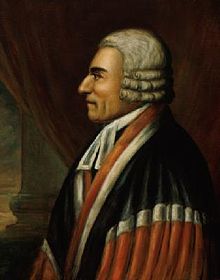Get Today in Masonic History into your Inbox. Sign up today for one of our email lists!
Need an article for your Trestleboard/Newsletter see our Use Policy
William Cushing is Born

Today in Masonic History William Cushing is born in 1732.
William Cushing was an American jurist.
Cushing was born on March 1st, 1732 in Sicituate, Massachusetts. In his youth his grandfather and a teacher at a local Latin school were his educators. He graduated from Harvard College in 1751. After, he became a member of the bar in Boston.
Cushing briefly practiced law in his home town of Sicituate before moving to the Massachusetts province's eastern district, which is now Maine. There he became the first practicing attorney in the eastern district. In 1762 he was called to become a barrister, again the first in the district. He continued to practice law in the eastern district until his father retired from Superior Court bench and the Governor appointed Cushing as his replacement.
Shortly after Cushing took over the position on the Superior Court, it was revealed Judges on the court were to be paid by London and in crowns, instead of by order of the local legislature. Cushing refused the money from England in preference to a local appropriation. After the beginning of the Revolutionary War, the Massachusetts Provincial Congress dissolved the Superior Court and reformed it. Cushing was the only judge kept from the previous court.
In 1783, Cushing presided over the case of Commonwealth v. Jennison. In the case Quock Walker, who was a slave, sued for his freedom under the new Massachusetts Constitution. In his charge to the jury, Cushing said the following regarding slavery and the new United States of America:
As to the doctrine of slavery and the right of Christians to hold Africans in perpetual servitude, and sell and treat them as we do our horses and cattle, that (it is true) has been heretofore countenanced by the Province Laws formerly, but nowhere is it expressly enacted or established. It has been a usage -- a usage which took its origin from the practice of some of the European nations, and the regulations of British government respecting the then Colonies, for the benefit of trade and wealth. But whatever sentiments have formerly prevailed in this particular or slid in upon us by the example of others, a different idea has taken place with the people of America, more favorable to the natural rights of mankind, and to that natural, innate desire of Liberty, with which Heaven (without regard to color, complexion, or shape of noses-features) has inspired all the human race. And upon this ground our Constitution of Government, by which the people of this Commonwealth have solemnly bound themselves, sets out with declaring that all men are born free and equal -- and that every subject is entitled to liberty, and to have it guarded by the laws, as well as life and property -- and in short is totally repugnant to the idea of being born slaves. This being the case, I think the idea of slavery is inconsistent with our own conduct and Constitution; and there can be no such thing as perpetual servitude of a rational creature, unless his liberty is forfeited by some criminal conduct or given up by personal consent or contract ...
The case relied on an earlier verdict handed down in 1781 when Elizabeth Freeman, also known as Mum Bett, became the first black slave to sue in Massachusetts and win her freedom. The case of Commonwealth v. Jennison led to slavery being abolished in Massachusetts.
When George Washington became the first President of the United States, Cushing was one of his first appointments to the United States Supreme Court. He was Washington's longest serving appointee and swore Washington in at his second inauguration. Washington attempted to promote Cushing to Chief Justice from Associate Justice. Cushing refused the promotion.
Cushing passed away on September 13th, 1810 in Sicituate.
Cushing was a member of St. Andrew's Lodge in Boston, Massachusetts.
This article provided by Brother Eric C. Steele.

